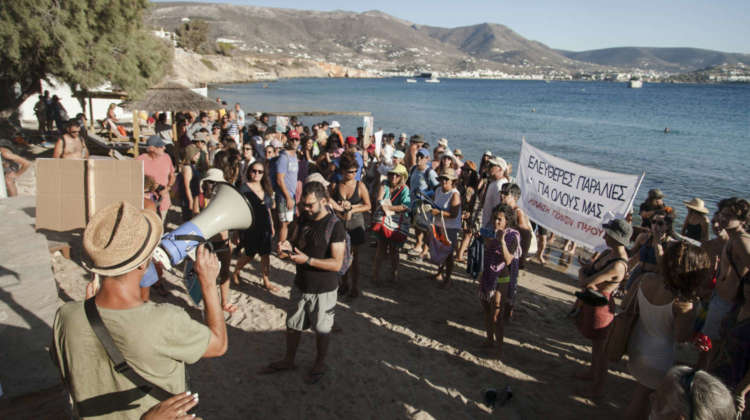
After the Ministry of Economy released a communication regarding the anticipated alterations to the laws governing concessions on the beaches, the Friends of Paros & Antiparos, alongside four other associations, have released a press statement outlining our basic principles which are non-negotiable.

While we are waiting for the text of the Bill on the Simple Use of the Seashore and the Beaches to be passed, so that we can comment on the proposed regulations, we summarise the non-negotiable basic principles that guided us in our summer initiatives and are already reflected in our text sent on 29/12/2023 to the Ministers of National Economy and Environment with our specific proposals for a legislative framework and its implementation that will improve the current situation.
- Our beaches are a public good, not “public property” as the title of the proposed bill describes them. According to the constitutional provision, coastal areas are a public good to be protected. Any economic development of these areas must recognise their constitutional status as a public good and not perceive them as a means of profitability.
- Citizens’ access to beaches should be free and unrestricted.
- Beaches are vital ecosystems. In this capacity, they are also constitutionally protected. No beach protected by the NATURA Convention or other protective legal framework should be leased.
- In any case, in order to guarantee the right of local communities to protect the public goods of their territory, in the case of concessions for economic exploitation, full transparency must be ensured in law and practice at all stages of the concession. Namely:
- At the stage of selecting beaches for concession and before the posting of tenders, the approval of the Municipal Consultation Committee is required.
- At the stage of signing the relevant contracts, the terms and limits of each concession should be made clear and easily accessible to citizens.
- During inspections by authorities, citizens must be informed of the beaches inspected and their findings.
- At the sanctions stage, the competent authorities should provide citizens with complete information on the type of sanctions and their final application.
- Any legislative intervention will prove ineffective if it does not address the key problem that emerged over the summer: the overlap of responsibilities between different stakeholders and the extreme shortages of staff and technical support. This problem proves insurmountable, especially in the insular counties, where the central services (Land Registry, Public Prosecutors) are located far away from the points in question. It is clear that the responsibility for managing the concession terms and maintaining the public character of the islands by removing any unlawfully placed umbrellas or structures should rest with the services operating on each island. These services should be able to constantly monitor and respond promptly to any situation. The service primarily accountable for this task should be familiar with the local characteristics, supervise and intervene directly, and be answerable to the citizens. In this case, it would be the Municipal Authority.
We hope that the Bill to be announced by the Ministry of Economy and Finance will be in line with the above basic principles expressed by the citizens’ movements for beaches. After all, the Government has repeatedly and publicly acknowledged the legitimacy of citizens’ demands. We hope that our proposals, based on the direct perception of the problems, aim to solve the dysfunctions, taking into account the actual spatial and operational data and capabilities (technological, administrative, etc.).
SIGNATURES:
CULTURAL ASSOCIATION OF PAROS ARCHILOCHOS
PAROS CITIZENS’ MOVEMENT
SYROS ENVIRONMENTAL QUALITY OBSERVATORY
NETWORK FOR SUSTAINABLE CYCLADES
FRIENDS OF PAROS & ANTIPAROS

Well done! Really hope it will work!!!
Great initiative . But important to ensure that new Act also safe guards ACCESS to beaches .
Where there are roads or pathways that have traditionally over many years given access to beaches that right of way should be protected even if passing through private way